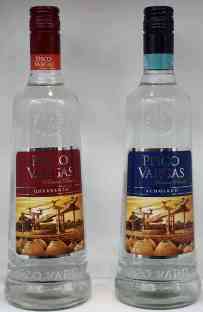 — Minister Oleachea slams Peruvian pisco producers intending to export the beverage under Chilean rules
— Minister Oleachea slams Peruvian pisco producers intending to export the beverage under Chilean rules
— Chileans will never change, they will always be the envious and looting enemy of Peru.
Chile, a looting and shameless country, not content with having stolen the name pisco, which belongs only to Peru, by mid June was demanding that Peruvian producers of that beverage renounce the Appellation d’origine “pisco” if they wanted to enter Chile and take part of the international, Brussels-organised contest “Spirits Selection by Concours Mondial de Bruxelles”.
Chilean thieves demand that Peruvian pisco be present at the contest under the generic name of grape brandy, in what amounts to one more episode of their behaviour of hardened robbers. This penchant for robbery did not disappear after the Salpeter War Chile waged against Peru and Bolivia in 1879, but it renews periodically theft after theft (in addition to the theft of pisco)—they encroach on Peruvian sea and land (Tacna’s terrestrial triangle) and claim that quinoa, potato, pisco sour, the marinera dance, and Peruvian confections (“picarones”, “suspiro a la limeña”) are not Peruvian but Chilean.
This Chileans’ behaviour is not only due to their criminal nature, rooted in their genes since the times of Lima-based Viceroyalty, when Peru sent to Chile the social scum, such as thieves, prostitutes, swindlers, wizards, false priests, quack doctors, etc. Also they act like that because of an inferiority complex—while in Peru developed and flourished the advanced Inca civilization and the ruling family tasted daily a great variety of dishes prepared with products brought in from different lands (which even came from as far south as now northern Chile), part of the territory of Chile was inhabited by the most primitive human race, as found Darwin, because they were cannibals who used to go about naked or put on coarse furs and ate raw meat, and they had not discovered fire.
Minister of production, Pedro Oleachea, criticized a group of Peruvian pisco producers who intended to export pisco to Chile dropping off in the process the denomination of Peru’s flag product or flagship liquor, thereby treasoning the Peruvian population who supported them when they put up a fight to protect the Peruvian character of the name pisco.
“It is unfortunate that there are some [pisco] brands that could go south in search of a market at the price of labelling pisco as grape brandy (a generic name), I think that Indecopi is right [...]. Something that we’ve never done is to export under false pretences for the sole purpose of earning a few more dollars”, said he talking with renowned journalist Phillip Butters, in Exitosa FM radio station.
Moreover, Indecopi considers punishing such exporters, even by cancelling authorisations for use of the pisco Appellation d’origine, a punishment likely to be extended to producers who intend to take part in the itinerant contest “Spirits Selection by Concours Mondial de Bruxelles”, which this year will take place in the Chilean city of La Serena, from 22 to 24 August.
About the dispute, the Minister recalled that “it is due to the two countries having or sharing a denomination, Chileans unfortunately registered the name before us, by changing in 1936 to “Pisco Elqui” the name of the town La Union (whereas the real Pisco Peruvian town has existed since the 16th century). The OIB with the documentation and all the topics that Peru is presenting must accept the Peruvian denomination; however, since The International Vine and Wine is a multinational, it adds or enters countries, not companies, it is very difficult to achieve anything if there is no consensus. The two denominations have been stopped”, he explained.
Related articles
Chilean Diplomacy--a nest of thieves
April the 5th, 1879. Theft-oriented Chile declares war on Peru
Chilean diplomats--dignified mob
Robbery-intoxicated Chile says it respects international law
Chilean robbers to beef up their Air Force
Chilean cynicism–“We waged a defensive war”
Vídeo: Gobierno chileno capitanea latrocinio al Perú de la causa, cebiche y pisco sour
Para patentar fibra y mejorar sus rebaños, Chile saca de contrabando alpacas de Puno
Chilenos intentan apropiarse del chilcano, bebida típica peruana
Chile, país ladrón, se apropia del pisco y la quinua burlándose de italianos
Chile, país ladrón, vuelve a robar origen de otro producto peruano: los picarones
ESPECIAL: China descubre el pisco en el siglo XIX, recuerda el embajador
Bachelet roba origen de la papa al Perú Chile brinda por el robo de nuestro pisco
Rateros chilenos birlan marca Tacama
La diplomacia ladrona de Chile
Chile busca locamente parasitar nuestro gas y para ello también usó la APEC
Senado chileno respalda latrocinio al Perú de triángulo terrestre
Parásitos chilenos se apoderan de tierras también en Colombia y no quieren salir
Chile: País ladrón y carente de vergüenza.- El saqueo chileno del Perú entre 1879 y 1884
Pistas del trasiego del hampa peruana a Chile
Vídeo: Chile, país ladrón, ahora roba origen del Tumi, denuncian artesanos
Chile, país ladrón, ahora roba denominación peruana del lomo saltado
Chile, país ladrón, pretende obligar a renunciar a productores peruanos a denominación del pisco
Vídeo: Gobierno chileno capitanea latrocinio al Perú de la causa, cebiche y pisco sour
Para patentar fibra y mejorar sus rebaños, Chile saca de contrabando alpacas de Puno
Chilenos intentan apropiarse del chilcano, bebida típica peruana
Chile, país ladrón, vuelve a robar origen de otro producto peruano: los picarones
ESPECIAL: China descubre el pisco en el siglo XIX, recuerda el embajador
Bachelet roba origen de la papa al Perú
Chile brinda por el robo de nuestro pisco
Rateros chilenos birlan marca Tacama
Chile busca locamente parasitar nuestro gas y para ello también usó la APEC
Senado chileno respalda latrocinio al Perú de triángulo terrestre
Parásitos chilenos se apoderan de tierras también en Colombia y no quieren salir

